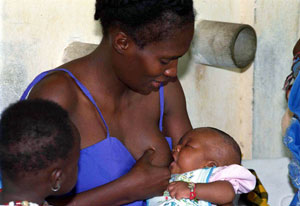Initiative seeks to reduce mother-to-child HIV transmission
May / June 2013 | Volume 12, Issue 3

Photo by WHO / Harry Anenden
An NIH/PEPFAR collaboration supports research
focused on reducing mother-to-child transmission of
HIV in sub-Saharan Africa.
Preventing mother-to-child transmission (PMTCT) of HIV is critical in sub-Saharan Africa, where more than 1,000 children are infected each day, primarily through mothers passing on the virus during pregnancy, childbirth or breast-feeding. Though effective preventive treatments - such as AZT, single-dose nevirapine and combinations of antiretroviral drugs - have lowered transmission rates in the U.S. to less than 1 percent, these same interventions have been less successful in many low- and middle-income countries.
In partnership with the U.S. Office of the Global AIDS Coordinator (OGAC) and the National Institute of Child Health and Human Development (NICHD) at NIH, Fogarty's Center for Global Health Studies recently hosted a meeting to launch a new network focused on strengthening PMTCT by promoting locally relevant, evidence-based treatment regimens and improving collaboration between HIV/AIDS researchers and program implementers. The Center will use as a platform 11 projects funded by an existing collaboration between NIH and the U.S. President's Emergency Plan for AIDS Relief (PEPFAR) and, more recently, its related program dedicated an ongoing forum for grantees, policymakers and implementers on the ground.
The initiative - whose ultimate aim is to inform NIH and other key stakeholders on how best to design PMTCT programs to improve health outcomes - will also address obstacles and challenges identified by the implementer community. Three more network meetings are planned, with the next session to be held in sub-Saharan Africa.
"We've made tremendous progress on this topic in the U.S., but in the developing world we haven’t done nearly as well," said Fogarty Director Dr. Roger I. Glass. "We now have some of the most effective interventions, and they're not being used. This is where implementation science can make a difference."
More Information
To view Adobe PDF files,
download current, free accessible plug-ins from Adobe's website.